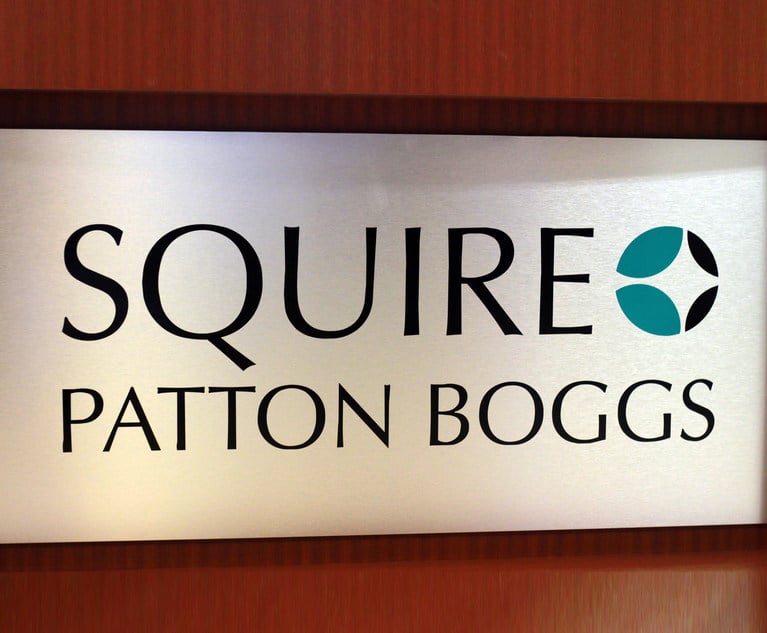New UK Internet of Things Law Could Complicate Tech Development
The U.K. appears poised to regulate consumer-facing IoT devices. Lawyers note some of the requirements are unique and may lead to a puzzling array of administrative, contractual, development and marketing challenges.
February 04, 2020 at 11:00 AM
3 minute read
The original version of this story was published on Legal Tech News
 Internet of things (IoT) concept.
Internet of things (IoT) concept.
The U.K. is set to reign in the Internet of Things (IoT) with a new regulation, and lawyers say it could usher in more third-party responsibility.
On Jan. 27, the U.K. government published its response to the regulatory proposals for IoT security consultation announced in May 2019.
Though the Department for Digital, Culture, Media and Sport noted it would address respondent's comments, it seems poised to keep its proposed mandatory baseline cybersecurity requirements for IoT devices.
The proposed law requires unique passwords that aren't resettable to a universal factory setting, which echoes California's IoT law that was enacted earlier this year.
However, while the U.K.'s proposed law shares similarities with industry best practices and California's IoT law, it is unique. Notably, the U.K.'s proposed law also requires a point of contact for consumers to report a security vulnerability. Such a requirement could become difficult as more IoT devices go to market.
"The administrative burden of setting unique passwords for each device (and then tracking them and dealing with requests and troubleshooting questions from end users about those passwords) could be administratively challenging, particularly with the exponential growth of [IoT] production," wrote Balch & Bingham partner Brandon Robinson in an email.
Also unique to the U.K. is the proposed requirement for IoT manufacturers to explicitly state how long its product will receive security updates, which is "a trickier requirement," noted Baker & Hostetler partner and Comcast's former vice president, deputy general counsel and deputy privacy officer Daniel Pepper.
A manufacturer's security support can be influenced by how popular the product is, Pepper explained, which could make it difficult to predict how long it will offer security updates.
In turn, many IoT manufacturers that ship to the U.K. may "low ball" their estimate to comply with the law, Robinson said. "Unless the IoT law establishes a floor, I would expect manufacturers to 'lowball' this preliminary estimate in order to maintain compliance and preserve flexibility."
Pepper agreed, but he noted companies may face a marketing conundrum if consumers question why a product's security life cycle is so short or differs from other regions.
The U.K.'s proposed IoT law may also place more contractual obligations on service providers, Pepper added. In an effort to abide to the U.K. law, product manufacturers may negotiate with suppliers to provide the support for the required updates, he said.
To be sure, despite the U.K.'s proposed regulation, it may not fully please consumer groups or manufacturers. Consumer groups may argue it doesn't go far enough to protect consumers, while manufacturers could claim "it's a difficult and challenging set of obligations, especially for devices that are very low-cost," Pepper said.
But IoT makers should prepare for IoT laws to spread in varying jurisdictions, Pepper and Robinson agreed.
"Having to tailor the design or production of IoT devices to multiple jurisdictions to maintain compliance could slow the growth of IoT devices globally and disincentivize businesses from offering IoT devices in certain areas because of such conflicts," Robinson added.
This content has been archived. It is available through our partners, LexisNexis® and Bloomberg Law.
To view this content, please continue to their sites.
Not a Lexis Subscriber?
Subscribe Now
Not a Bloomberg Law Subscriber?
Subscribe Now
NOT FOR REPRINT
© 2025 ALM Global, LLC, All Rights Reserved. Request academic re-use from www.copyright.com. All other uses, submit a request to [email protected]. For more information visit Asset & Logo Licensing.
You Might Like
View All
Squire Patton Boggs Hires 7-Lawyer Team to Beef Up ESG Practice in Brussels
2 minute read

Kirkland’s O’Shea Acts Alongside Former Outfit Simpson Thacher on KKR Deal
2 minute read
King & Spalding and Ex-Partner Accused of Fraud After Client Claims £1.7 Million Deposit Loss
2 minute readTrending Stories
- 1US Judge Dismisses Lawsuit Brought Under NYC Gender Violence Law, Ruling Claims Barred Under State Measure
- 24th Circuit Upholds Virginia Law Restricting Online Court Records Access
- 3Lawsuit Against Major Food Brands Could Be Sign of Emerging Litigation Over Processed Foods
- 4Fellows LaBriola LLP is Pleased to Announce that Alisha Goel Has Become Associated with The Firm
- 5Law Firms Turn to 'Golden Handcuffs' to Rein In Partner Movement
Who Got The Work
J. Brugh Lower of Gibbons has entered an appearance for industrial equipment supplier Devco Corporation in a pending trademark infringement lawsuit. The suit, accusing the defendant of selling knock-off Graco products, was filed Dec. 18 in New Jersey District Court by Rivkin Radler on behalf of Graco Inc. and Graco Minnesota. The case, assigned to U.S. District Judge Zahid N. Quraishi, is 3:24-cv-11294, Graco Inc. et al v. Devco Corporation.
Who Got The Work
Rebecca Maller-Stein and Kent A. Yalowitz of Arnold & Porter Kaye Scholer have entered their appearances for Hanaco Venture Capital and its executives, Lior Prosor and David Frankel, in a pending securities lawsuit. The action, filed on Dec. 24 in New York Southern District Court by Zell, Aron & Co. on behalf of Goldeneye Advisors, accuses the defendants of negligently and fraudulently managing the plaintiff's $1 million investment. The case, assigned to U.S. District Judge Vernon S. Broderick, is 1:24-cv-09918, Goldeneye Advisors, LLC v. Hanaco Venture Capital, Ltd. et al.
Who Got The Work
Attorneys from A&O Shearman has stepped in as defense counsel for Toronto-Dominion Bank and other defendants in a pending securities class action. The suit, filed Dec. 11 in New York Southern District Court by Bleichmar Fonti & Auld, accuses the defendants of concealing the bank's 'pervasive' deficiencies in regards to its compliance with the Bank Secrecy Act and the quality of its anti-money laundering controls. The case, assigned to U.S. District Judge Arun Subramanian, is 1:24-cv-09445, Gonzalez v. The Toronto-Dominion Bank et al.
Who Got The Work
Crown Castle International, a Pennsylvania company providing shared communications infrastructure, has turned to Luke D. Wolf of Gordon Rees Scully Mansukhani to fend off a pending breach-of-contract lawsuit. The court action, filed Nov. 25 in Michigan Eastern District Court by Hooper Hathaway PC on behalf of The Town Residences LLC, accuses Crown Castle of failing to transfer approximately $30,000 in utility payments from T-Mobile in breach of a roof-top lease and assignment agreement. The case, assigned to U.S. District Judge Susan K. Declercq, is 2:24-cv-13131, The Town Residences LLC v. T-Mobile US, Inc. et al.
Who Got The Work
Wilfred P. Coronato and Daniel M. Schwartz of McCarter & English have stepped in as defense counsel to Electrolux Home Products Inc. in a pending product liability lawsuit. The court action, filed Nov. 26 in New York Eastern District Court by Poulos Lopiccolo PC and Nagel Rice LLP on behalf of David Stern, alleges that the defendant's refrigerators’ drawers and shelving repeatedly break and fall apart within months after purchase. The case, assigned to U.S. District Judge Joan M. Azrack, is 2:24-cv-08204, Stern v. Electrolux Home Products, Inc.
Featured Firms
Law Offices of Gary Martin Hays & Associates, P.C.
(470) 294-1674
Law Offices of Mark E. Salomone
(857) 444-6468
Smith & Hassler
(713) 739-1250








